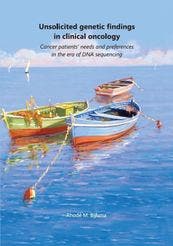Rhodé Bijlsma
Unsolicited genetic findings in clinical oncology. Cancer patients’ needs and preferences in the era of DNA sequencing

- Datum
- (Co) promotoren
- 09-01-2019
- prof. Dr. A.L. Bredenoord, prof. Dr. E.E. Voest, dr. A.M. May- de Groot, dr. H. Wessels-Wijnia
Samenvatting
The research described in this thesis focuses on cancer patients’ intentions, needs and preferences with regard to receiving unsolicited genetic information obtained by tumor DNA analysis. We combine qualitative research and quantitative research methods with a normative ethical reflection on the introduction of DNA sequencing into daily practice in clinical oncology. In precision medicine, somatic and germline DNA sequencing are essential to make genome-guided treatment decisions in cancer patients. However, it can also uncover unsolicited findings (UFs) in germline DNA that could have a substantial impact on the lives of patients and their relatives. It is therefore critical to understand cancer patients’ preferences concerning UFs derived from sequencing. Cancer patients may be particularly vulnerable (physical and emotional) at the moment they have to make decisions concerning NGS and possible unsolicited findings. Understanding what a cancer patient could experience during the process of disclosing unsolicited findings from NGS will help oncologists in daily practice to accompany patients in making informed decisions In one of our qualitative studies, four interrelated themes were recognized when cancer patients were asked about their preferences, intentions, and needs concerning the return of unsolicited findings generated during a NGS procedure: cancer patients’ need to control their lives (theme 1), associated family dynamics (theme 2), and dealing with both the cognitive complexity (theme 3) and emotional complexity (theme 4) of receiving the findings. These insights with regard to the four themes contribute to a better understanding of what cancer patients consider important, and what motivates and influences them when they make decisions on the disclosure of unsolicited findings. This thesis also shows that education and counseling are vital to enable cancer patients to make informed decisions. Even for highly educated people, this topic is rather difficult to understand. Thus, to make an informed, autonomous decision with regard to the return of unsolicited findings, understandable, personalized and accessible information (written or digital) and educational material must be available to empower cancer patients and their family members. Our quantitative study showed that the vast majority of cancer patients desires to receive all UFs of genome testing, although a substantial minority does not wish to receive non-actionable findings. Importantly, the interest in learning about four different categories of UFs (actionable, non-actionable, reproductive significance, unknown significance) is equally high among curative and advanced-stage patients. However, there is also a substantial group of patients who do not want to be informed. Presenting categories of genetic test results was found to be a useful tool in enabling cancer patients to make a well-informed decision about receiving unsolicited findings from NGS A binning approach to UFs allows patients to accept actionable findings and at the same time to refuse non-actionable or uncertain findings. Binning helps a considerable minority of patients who do not wish to know everything. Especially women would benefit from differentiating between categories of UFs along these lines.
